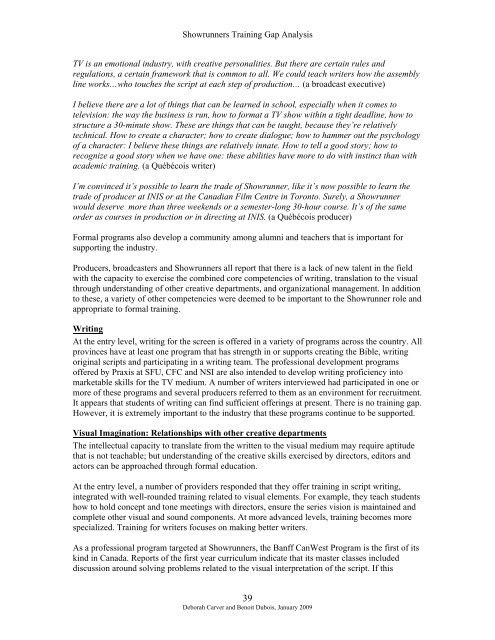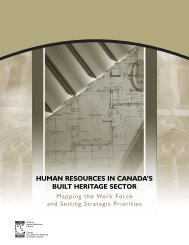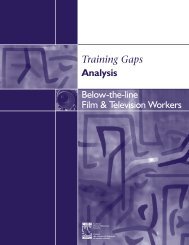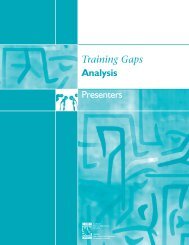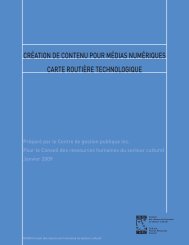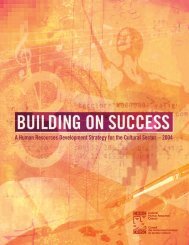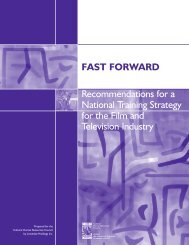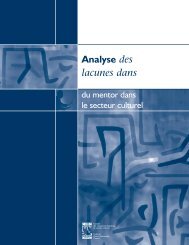Showrunners - Training Gaps Analysis - Cultural Human Resources ...
Showrunners - Training Gaps Analysis - Cultural Human Resources ...
Showrunners - Training Gaps Analysis - Cultural Human Resources ...
You also want an ePaper? Increase the reach of your titles
YUMPU automatically turns print PDFs into web optimized ePapers that Google loves.
<strong>Showrunners</strong> <strong>Training</strong> Gap <strong>Analysis</strong><br />
TV is an emotional industry, with creative personalities. But there are certain rules and<br />
regulations, a certain framework that is common to all. We could teach writers how the assembly<br />
line works…who touches the script at each step of production… (a broadcast executive)<br />
I believe there are a lot of things that can be learned in school, especially when it comes to<br />
television: the way the business is run, how to format a TV show within a tight deadline, how to<br />
structure a 30-minute show. These are things that can be taught, because they’re relatively<br />
technical. How to create a character; how to create dialogue; how to hammer out the psychology<br />
of a character: I believe these things are relatively innate. How to tell a good story; how to<br />
recognize a good story when we have one: these abilities have more to do with instinct than with<br />
academic training. (a Québécois writer)<br />
I’m convinced it’s possible to learn the trade of Showrunner, like it’s now possible to learn the<br />
trade of producer at INIS or at the Canadian Film Centre in Toronto. Surely, a Showrunner<br />
would deserve more than three weekends or a semester-long 30-hour course. It’s of the same<br />
order as courses in production or in directing at INIS. (a Québécois producer)<br />
Formal programs also develop a community among alumni and teachers that is important for<br />
supporting the industry.<br />
Producers, broadcasters and <strong>Showrunners</strong> all report that there is a lack of new talent in the field<br />
with the capacity to exercise the combined core competencies of writing, translation to the visual<br />
through understanding of other creative departments, and organizational management. In addition<br />
to these, a variety of other competencies were deemed to be important to the Showrunner role and<br />
appropriate to formal training.<br />
Writing<br />
At the entry level, writing for the screen is offered in a variety of programs across the country. All<br />
provinces have at least one program that has strength in or supports creating the Bible, writing<br />
original scripts and participating in a writing team. The professional development programs<br />
offered by Praxis at SFU, CFC and NSI are also intended to develop writing proficiency into<br />
marketable skills for the TV medium. A number of writers interviewed had participated in one or<br />
more of these programs and several producers referred to them as an environment for recruitment.<br />
It appears that students of writing can find sufficient offerings at present. There is no training gap.<br />
However, it is extremely important to the industry that these programs continue to be supported.<br />
Visual Imagination: Relationships with other creative departments<br />
The intellectual capacity to translate from the written to the visual medium may require aptitude<br />
that is not teachable; but understanding of the creative skills exercised by directors, editors and<br />
actors can be approached through formal education.<br />
At the entry level, a number of providers responded that they offer training in script writing,<br />
integrated with well-rounded training related to visual elements. For example, they teach students<br />
how to hold concept and tone meetings with directors, ensure the series vision is maintained and<br />
complete other visual and sound components. At more advanced levels, training becomes more<br />
specialized. <strong>Training</strong> for writers focuses on making better writers.<br />
As a professional program targeted at <strong>Showrunners</strong>, the Banff CanWest Program is the first of its<br />
kind in Canada. Reports of the first year curriculum indicate that its master classes included<br />
discussion around solving problems related to the visual interpretation of the script. If this<br />
39<br />
Deborah Carver and Benoit Dubois, January 2009


